译林版(三起)六年级下册 期中复习课件(共59张PPT)
文档属性
| 名称 | 译林版(三起)六年级下册 期中复习课件(共59张PPT) | 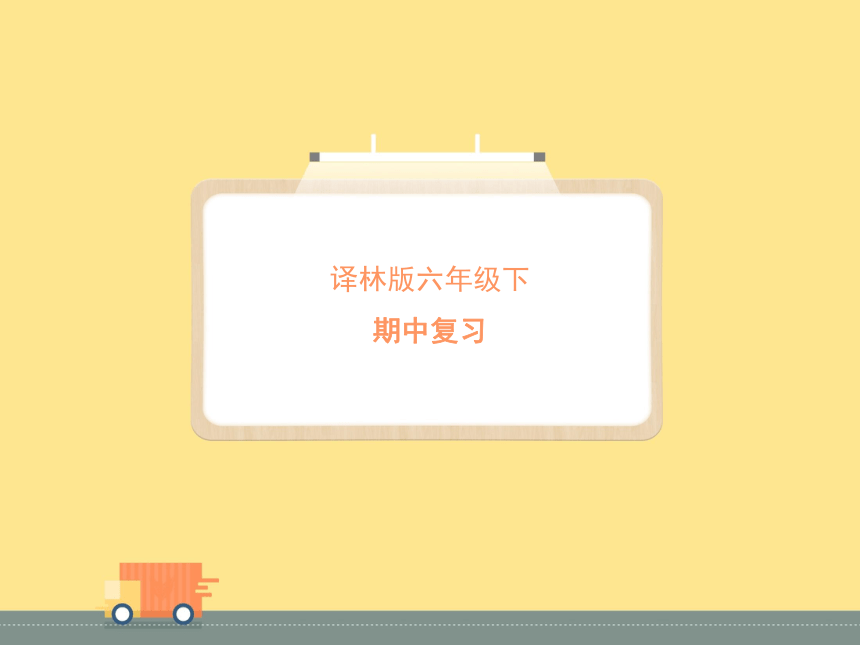 | |
| 格式 | pptx | ||
| 文件大小 | 1.8MB | ||
| 资源类型 | 试卷 | ||
| 版本资源 | 牛津译林版 | ||
| 科目 | 英语 | ||
| 更新时间 | 2022-01-20 18:52:14 | ||
图片预览



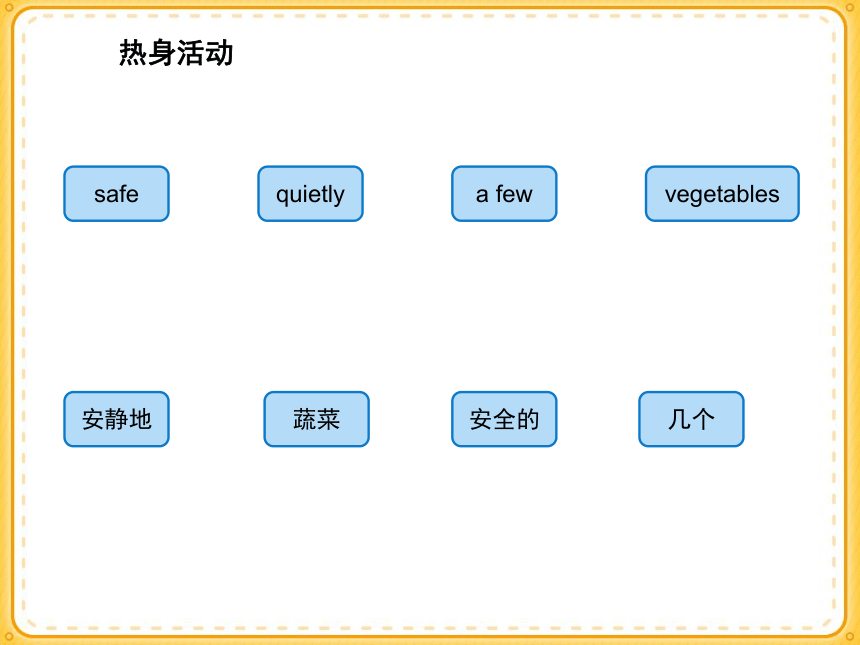



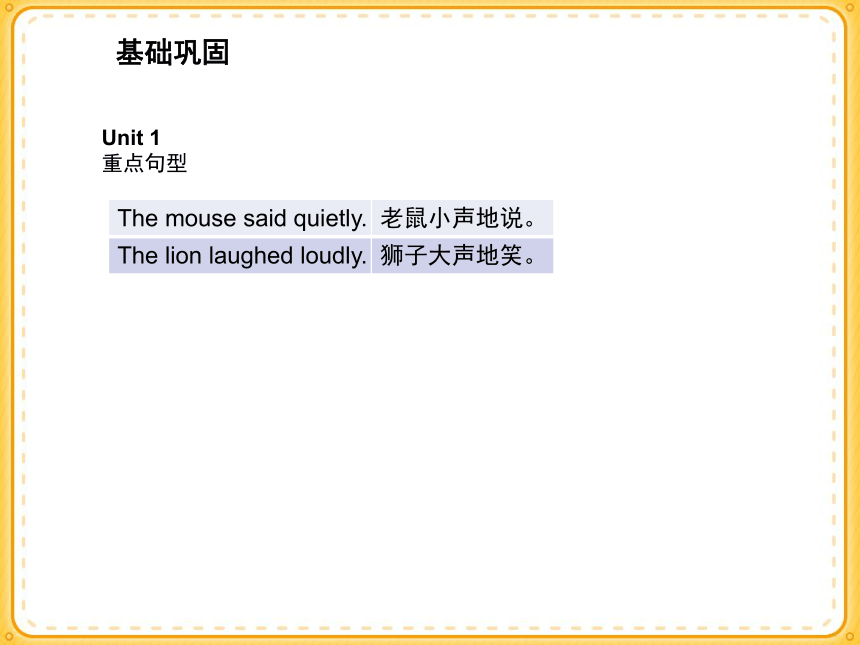
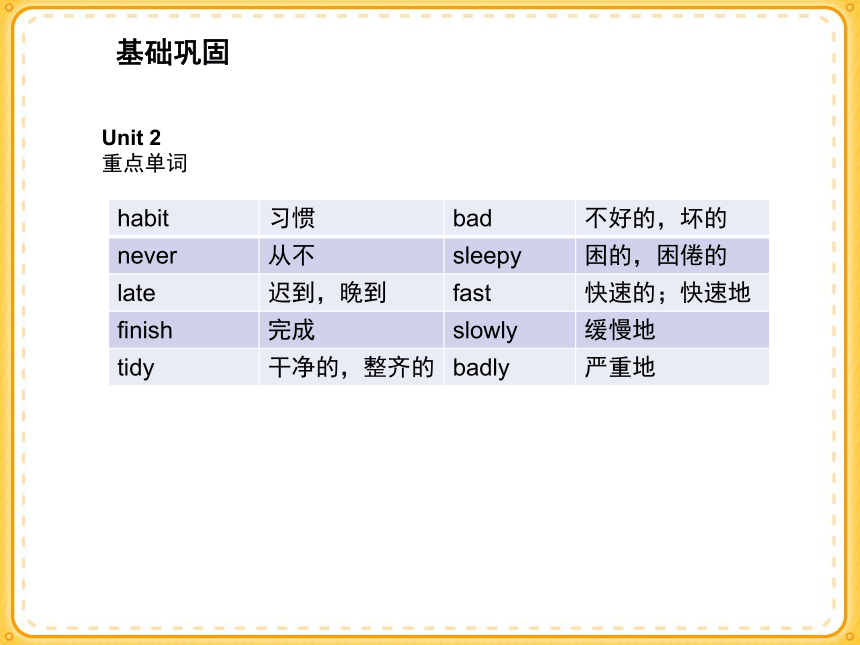
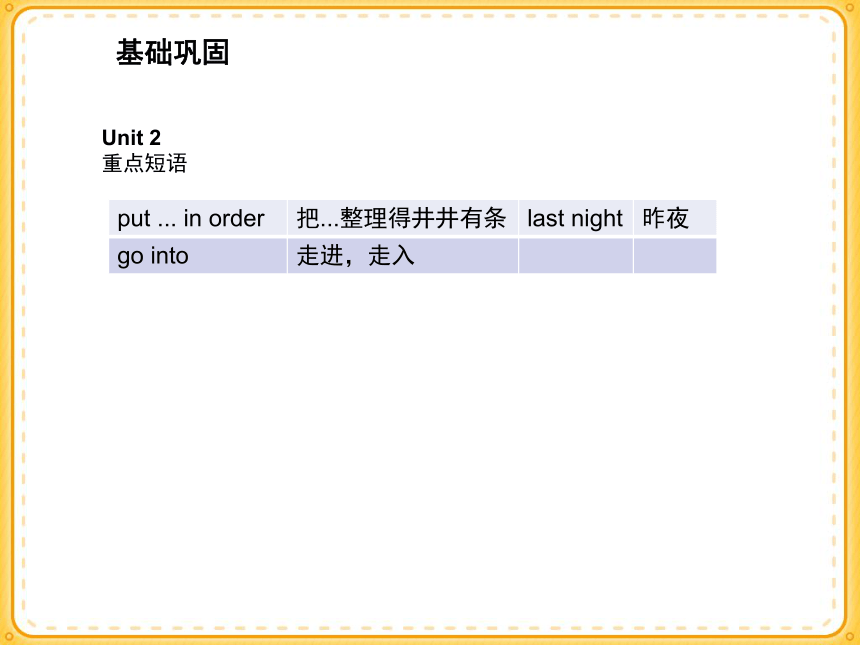
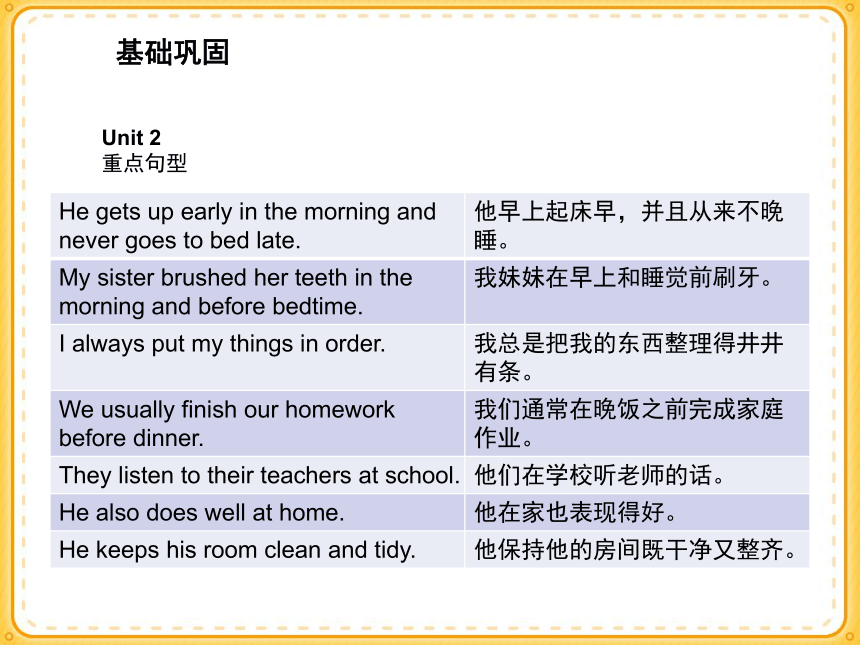
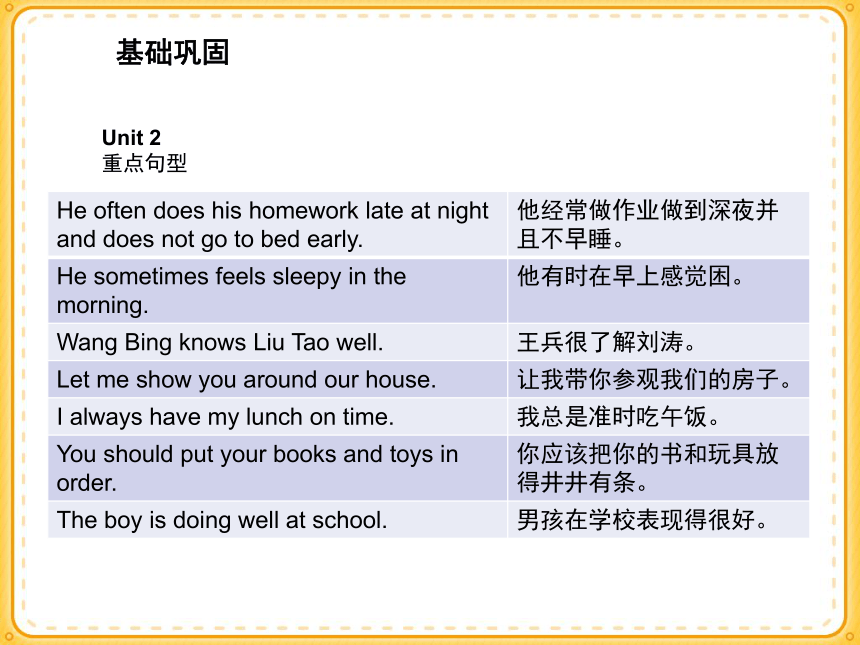
文档简介
(共59张PPT)
译林版六年级下
期中复习
六年级下
期中复习
基础巩固
重点单词
重点短语
重点句型
副词的使用
可数名词和不可数名词
情态动词的使用
1. 掌握Unit1-4的重点单词、短语、句型
2. 掌握副词的用法
3. 掌握可数名词和不可数名词的用法
4. 掌握情态动词的用法
safe
quietly
a few
vegetables
安静地
蔬菜
安全的
几个
safe
quietly
a few
vegetables
安静地
蔬菜
安全的
几个
Unit 1
重点单词
mouse 老鼠 net 网
large 大的 bite 咬
strong 强大的,强壮的 sharp 锋利的,尖的
weak 弱的,软弱的 deep 深
cheer 欢呼 reach 够得着
hit 打,击 soon 不久,很快
quietly 小声地,安静地 ground 地面,地上
loudly 大声地 happily 开心地,高兴地
Unit 1
重点短语
walk by 走过,路过 just then 就在那时
wake ... up 吵醒,叫醒 get out 出来,出去
some day 某一天 from then on 从那时起
the next day 第二天 pour ... into 把...倒入
Unit 1
重点句型
The mouse said quietly. 老鼠小声地说。
The lion laughed loudly. 狮子大声地笑。
Unit 2
重点单词
habit 习惯 bad 不好的,坏的
never 从不 sleepy 困的,困倦的
late 迟到,晚到 fast 快速的;快速地
finish 完成 slowly 缓慢地
tidy 干净的,整齐的 badly 严重地
Unit 2
重点短语
put ... in order 把...整理得井井有条 last night 昨夜
go into 走进,走入
Unit 2
重点句型
He gets up early in the morning and never goes to bed late. 他早上起床早,并且从来不晚睡。
My sister brushed her teeth in the morning and before bedtime. 我妹妹在早上和睡觉前刷牙。
I always put my things in order. 我总是把我的东西整理得井井有条。
We usually finish our homework before dinner. 我们通常在晚饭之前完成家庭作业。
They listen to their teachers at school. 他们在学校听老师的话。
He also does well at home. 他在家也表现得好。
He keeps his room clean and tidy. 他保持他的房间既干净又整齐。
Unit 2
重点句型
He often does his homework late at night and does not go to bed early. 他经常做作业做到深夜并且不早睡。
He sometimes feels sleepy in the morning. 他有时在早上感觉困。
Wang Bing knows Liu Tao well. 王兵很了解刘涛。
Let me show you around our house. 让我带你参观我们的房子。
I always have my lunch on time. 我总是准时吃午饭。
You should put your books and toys in order. 你应该把你的书和玩具放得井井有条。
The boy is doing well at school. 男孩在学校表现得很好。
Unit 3
重点单词
healthy 健康的 cola 可乐
diet 饮食 need 需要
Unit 3
重点短语
a little 一点 at a time 一次
a few 几个 too much 太多
Unit 3
重点句型
I eat a lot of noodles. 我吃很多面条。
We eat a lot of meat. 我们吃很多肉。
They have some vegetables. 他们吃一些蔬菜。
You have some bread. 你们吃一些面包。
He eats a few eggs. 他吃几个鸡蛋。
She drinks a little water. 她喝一点水。
You shouldn't drink too much cola. 你不应该喝太多的可乐。
Can we have a rest 我们能休息一下吗?
She eats a little rice. 她吃了一点米饭。
Unit 4
重点单词
road 马路,公路 stay 保持
safety 安全 light 灯
safely 安全地 pavement 人行道
safe 安全的 follow 遵守
cross 穿过,穿行 rule 规则
must 必须
Unit 4
重点短语
zebra crossing 斑马线 look out for 当心,提防
Unit 4
重点句型
- How can you cross the road safely - I must look for a zebra crossing. -你如何安全地过马路?
-我必须寻找一条斑马线。
- Can I watch TV - No, you can't. It's late. You must go to bed. -我能看电视吗?
-不,你不能。现在晚了。你必须去睡觉。
- Must I go to see the doctor - Yes, you must. You can't go to school because you are sick. -我必须去看医生吗?
-是的,你一定要去。你不能去学校因为你生病了。
- What must you not do on the road - We mustn't play on the road. -你们禁止在马路上做什么?
-我们禁止在马路上玩。
1. 选择合适的短语填空
(1) He is a happy boy. He always ______.
(2) Liu Tao also has good habits. He keeps his room ______.
(3) - Do you have ______
- Yes, I eat some fruit every day.
(4) The red man tells us, we mustn't ______ now.
(5) If we can't find the zebra crossing near you, we can cross the road ______.
(6) Please follow the rules and ______ on the road.
A. clean and tidy B. on the left C. laughs happily D. cross the road E. a healthy diet F. bad habits G. with other people H. stay safe
(1) C (2) A (3) E (4) D (5) G (6) H
(1) 根据句意,上文提到是happy boy,所以下文肯定是和happy相关的,故选 C
(2) 上文中的good habits,表明下文的空格处必须是一个好习惯,keep one's room clean and tidy 保持某人的房间干净和整洁,故选A
(3) 根据下文的eat fruit,表明上文空格处是和饮食有关的,故选 E
(4) red man 红灯,是交通规则,不能过马路,故选 D
(5) can't find zebra crossing,根据课文内容,故选 G
(6) 根据课文内容,表明我们要保证安全,故选 H
2. 单项选择
It's seven o'clock. David has to ______.
A. go to school B. going to school C. went to school
A
介词to后加动词原形,故选 A
3. 单项选择
Chinese people often have some ______ and steamed buns for breakfast.
A. bread B. sausages C. porridge
C
A和B选项都是西方食物,故选 C
4. 单项选择
You shouldn't drink ______ cola.
A. too much B. a few C. too many
A
cola是不可数名词,应用too much,故选 A
5. 根据要求完成句子
Tom did his homework just now. (改为否定句)
Tom ______ ______ his homework just now.
变否定,be助情,not加
didn't do
副词的使用
形容词变副词
一般情况下在形容词后直接加“ly”
e.g. quick--quickly
以辅音字母+y结尾的形容词要变y为i,再加“ly”
e.g. happy--happily
有些词既可以做形容词,也可以做副词
e.g. fast--fast
将下列形容词变为副词
(1) beautiful _____________ (2) sad _____________
(3) busy ________________ (4) fast _____________
(1) beautifully (2) sadly (3) busily (4) fast
(1) beautiful的副词为直接加ly
(2) sad的副词为直接加ly
(3) busy的副词为变y为i,再加ly
(4) fast的副词形式仍然是fast
常见不可数名词归类
表示液体:water, juice, milk, coffee, coke, ink(墨水)...
表示自然现象:snow, rain, wind ...
表示食品:food, bread, rice, jam(果酱), honey(蜂蜜), meat(肉类), beef(牛肉), pork(猪肉), chicken, fish, toufu(豆腐) ...
其它:paper, news, homework, advice(建议)...
不可数名词 & 可数名词的复数变化
可数名词复数
(1)可数名词复数的规则变化
一般情况下,在名词末尾直接加-s,读音变化,单词结尾是清辅音读/s/,如:book--books;结尾是浊辅音或元音读/z/,
如:friend--friends
以s/x/ch/sh结尾的词,在该词末尾加-es构成复数,读/iz/,
如:bus--buses, box--boxes, watch--watches, flash--flashes
可数名词复数
以“辅音字母+y”结尾的名词,变y为i,再加-es,读/iz/,
如:story--stories, baby--babies
以“元音字母+y”结尾的名词,直接加-s,读/z/,如:day--days
以“o”结尾的名词一般分为两类:
1. 有生命的名词后加-es,读/z/,如:potato--potatoes,
tomato--tomatoes
2. 无生命的名词后加-s,读/z/,如:photo--photos, zoo--zoos
可数名词复数
以-f/-fe结尾的名词,多将-f/-fe变为-ves,读/vz/, 如:knife--knives, leaf--leaves
有部分以-f/-fe结尾的名词直接加-s,如:roof--roofs
可数名词复数
(2)可数名词复数的不规则变化
改变单数名词中的元音字母,如:man--men, woman--women, policeman--policemen, foot--feet, goose--geese, tooth--teeth
单复数同形,如:sheep, police, fish, deer, Chinese, Japanese
在词尾加-en/-ren,如:ox--oxen, child--children
其它:mouse--mice
1. a lot of和lots of表示“许多”:+可数名词/不可数名词
many/much也表示“许多”:
many+可数名词
much+不可数名词
2. a few与a little都表示数量虽少但毕竟还有,强调“有”
a few+可数名词
a little+不可数名词
写出下列单词的复数形式
(1) sheep _______ (2) day _______ (3) child _______
(4) photo _______ (5) watch _______ (6) tomato _______
(1) sheep (2) days (3) children (4) photos (5) watches (6) tomatoes
(1) sheep单复数同形,故填sheep
(2) day是以“元音字母+y”结尾,直接加-s,故填days
(3) child复数变化不规则,复数为children
(4) photo是以“o”结尾的无生命的名词,加-s,故填photos
(5) watch是以ch结尾,复数加-es,故填watches
(6) tomato是以“o”结尾的有生命的名词,加-es,故填tomatoes
一、情态动词的定义
情态动词本身有一定的词义,但不能单独作谓语,必须和其它动词一起构成谓语,表示说话人的情感、态度、语气。
主要有:can, could, may, must, have to, would, shall, should
情态动词
二、情态动词的特点
情态动词一般没有人称和数的变化;后边跟动词原形;否定形式直接在情态动词后加not
注意:have to例外,它有人称、数和时态的变化
用适当的情态动词填空
(1) You _______ take more exercise.
(2) _______ you like some tea
(3) - _______ I use your eraser
- Yes, you can.
(1) should (2) Would (3) Can
(1) 根据句意,这里应该是以劝告的语气让人多做锻炼,故填should
(2) 询问某人是否需要什么东西用“would ... like”,故填Would
(3) 根据答句”Yes, you can.”可知,问句应该是“Can I ... ”,故填Can
1. 英汉互译
(1)一次喝一点橙汁 ______________
(2) 只有几个西红柿 ______________
(3) have some steamed buns and sausages______________
(4) cheer for them ______________
(1) drink a little juice at a time
(2) only have a few tomatoes
(3) 吃一些馒头和香肠
(4) 为他们欢呼
2. 用所给词的适当形式填空
(1) He brings some water ______ (quick) and pours it into the hole.
(2) - Can I have some ______ (mango)
- Sure, here you are.
(3) Here ______ (be) some ______ (meat) for you.
(4) The boy ______ (fly) a kite in the park tomorrow afternoon.
(1) quickly (2) mangoes (3) is; meat (4) will fly/is going to fly
(1) 空格处是用来修饰bring的,所以应该用quick的副词形式,故填quickly
(2) 空格前有some,所以应该用mango的复数形式,因为mango属于以o结尾的有生命的可数名词,故填mangoes
(3) meat是不可数名词,所以be动词该用is
(4) 根据下文的tomorrow afternoon,判断该句的时态为一般将来时,主语是第三人称单数the boy,故填will fly/is going to fly
3. 单项选择
- In London, people drive on the ______ side of the road.
- Oh, we drive on the ______ side in Changzhou.
A. left; right B. right; left C. right; right
A
考察中西方驾驶的方向差异,根据课文的culture time可知,西方靠左驾驶,中国(除去香港和澳门)靠右驾驶,故选 A
4. 单项选择
Look ______. Here ______ the bus.
A. for; come B. for; comes C. out; comes
C
look out表示“小心、当心”
5. 单项选择
- Did you go to bed ______ last night
- Yes, but why I'm so sleepy
A. late B. later C. early
C
but这个转折词告诉我们要填和sleepy相反的情况。所以是
上床睡觉很早但是感觉到困。
1. 根据要求完成句子
They sang happily yesterday afternoon.(对划线部分提问)
______ ______ they ______ yesterday afternoon
How; did; sing
happily是副词,用来修饰sang
特殊疑问句的结构是:特殊疑问词+一般疑问句,根据sang表明该句为一般过去式,所以加助动词did;助动词后面的动词用原形
2. 根据要求完成句子
I got some presents from my parents. (改为一般疑问句)
______ you ______ ______ presents from ______ parents
Did; get any; your
变疑问,be助情,往前拉;some要变成any;
人称要变化(第一人称变第二人称)
3. 根据要求完成句子
You shouldn't eat or drink in the classroom. (改为祈使句)
______ ______ or ______ in the classroom.
Don't; eat; drink
祈使句的否定形式:
1. Don't+动词原形
2. No+ving
4. 圈出句子中划线部分发音不同的单词
(1) I shout, “Let's go outing and go to the countryside by car.”
(2) In the morning, the visitor saw fourteen horses running very fast.
(3) I washed clothes, cleaned the floor and cooked this evening, I was so busy.
(4) My friend, Tim likes eating sweets, cakes and eggs for his breakfast.
(1) countryside (2) visitor (3) cleaned (4) eggs
(1) shout, outing发/au/,countryside发/ /
(2) morning, horses发/ /,visitor发/ /
(3) washed, cooked发/t/,cleaned发/d/
(4) likes, cakes发/s/,eggs发/z/
5. 将下列句子重新排序
a. All right. Hurry up, we're late.
b. Good idea. But how do we go there
c. There is a new film in City Cinema. Let's go and see it
d. The bus comes, but the bus is so full. We can't get on the bus.
e. Let's go by taxi then. We can go there fast.
f. But look, there are so many cars on the street. All the taxis are stopping now.
g. Let's go there by metro. Look, there is the metro station here.
h. By bus. Bus B2 is for the cinema.
c b h d e f g a
译林版六年级下
期中复习
六年级下
期中复习
基础巩固
重点单词
重点短语
重点句型
副词的使用
可数名词和不可数名词
情态动词的使用
1. 掌握Unit1-4的重点单词、短语、句型
2. 掌握副词的用法
3. 掌握可数名词和不可数名词的用法
4. 掌握情态动词的用法
safe
quietly
a few
vegetables
安静地
蔬菜
安全的
几个
safe
quietly
a few
vegetables
安静地
蔬菜
安全的
几个
Unit 1
重点单词
mouse 老鼠 net 网
large 大的 bite 咬
strong 强大的,强壮的 sharp 锋利的,尖的
weak 弱的,软弱的 deep 深
cheer 欢呼 reach 够得着
hit 打,击 soon 不久,很快
quietly 小声地,安静地 ground 地面,地上
loudly 大声地 happily 开心地,高兴地
Unit 1
重点短语
walk by 走过,路过 just then 就在那时
wake ... up 吵醒,叫醒 get out 出来,出去
some day 某一天 from then on 从那时起
the next day 第二天 pour ... into 把...倒入
Unit 1
重点句型
The mouse said quietly. 老鼠小声地说。
The lion laughed loudly. 狮子大声地笑。
Unit 2
重点单词
habit 习惯 bad 不好的,坏的
never 从不 sleepy 困的,困倦的
late 迟到,晚到 fast 快速的;快速地
finish 完成 slowly 缓慢地
tidy 干净的,整齐的 badly 严重地
Unit 2
重点短语
put ... in order 把...整理得井井有条 last night 昨夜
go into 走进,走入
Unit 2
重点句型
He gets up early in the morning and never goes to bed late. 他早上起床早,并且从来不晚睡。
My sister brushed her teeth in the morning and before bedtime. 我妹妹在早上和睡觉前刷牙。
I always put my things in order. 我总是把我的东西整理得井井有条。
We usually finish our homework before dinner. 我们通常在晚饭之前完成家庭作业。
They listen to their teachers at school. 他们在学校听老师的话。
He also does well at home. 他在家也表现得好。
He keeps his room clean and tidy. 他保持他的房间既干净又整齐。
Unit 2
重点句型
He often does his homework late at night and does not go to bed early. 他经常做作业做到深夜并且不早睡。
He sometimes feels sleepy in the morning. 他有时在早上感觉困。
Wang Bing knows Liu Tao well. 王兵很了解刘涛。
Let me show you around our house. 让我带你参观我们的房子。
I always have my lunch on time. 我总是准时吃午饭。
You should put your books and toys in order. 你应该把你的书和玩具放得井井有条。
The boy is doing well at school. 男孩在学校表现得很好。
Unit 3
重点单词
healthy 健康的 cola 可乐
diet 饮食 need 需要
Unit 3
重点短语
a little 一点 at a time 一次
a few 几个 too much 太多
Unit 3
重点句型
I eat a lot of noodles. 我吃很多面条。
We eat a lot of meat. 我们吃很多肉。
They have some vegetables. 他们吃一些蔬菜。
You have some bread. 你们吃一些面包。
He eats a few eggs. 他吃几个鸡蛋。
She drinks a little water. 她喝一点水。
You shouldn't drink too much cola. 你不应该喝太多的可乐。
Can we have a rest 我们能休息一下吗?
She eats a little rice. 她吃了一点米饭。
Unit 4
重点单词
road 马路,公路 stay 保持
safety 安全 light 灯
safely 安全地 pavement 人行道
safe 安全的 follow 遵守
cross 穿过,穿行 rule 规则
must 必须
Unit 4
重点短语
zebra crossing 斑马线 look out for 当心,提防
Unit 4
重点句型
- How can you cross the road safely - I must look for a zebra crossing. -你如何安全地过马路?
-我必须寻找一条斑马线。
- Can I watch TV - No, you can't. It's late. You must go to bed. -我能看电视吗?
-不,你不能。现在晚了。你必须去睡觉。
- Must I go to see the doctor - Yes, you must. You can't go to school because you are sick. -我必须去看医生吗?
-是的,你一定要去。你不能去学校因为你生病了。
- What must you not do on the road - We mustn't play on the road. -你们禁止在马路上做什么?
-我们禁止在马路上玩。
1. 选择合适的短语填空
(1) He is a happy boy. He always ______.
(2) Liu Tao also has good habits. He keeps his room ______.
(3) - Do you have ______
- Yes, I eat some fruit every day.
(4) The red man tells us, we mustn't ______ now.
(5) If we can't find the zebra crossing near you, we can cross the road ______.
(6) Please follow the rules and ______ on the road.
A. clean and tidy B. on the left C. laughs happily D. cross the road E. a healthy diet F. bad habits G. with other people H. stay safe
(1) C (2) A (3) E (4) D (5) G (6) H
(1) 根据句意,上文提到是happy boy,所以下文肯定是和happy相关的,故选 C
(2) 上文中的good habits,表明下文的空格处必须是一个好习惯,keep one's room clean and tidy 保持某人的房间干净和整洁,故选A
(3) 根据下文的eat fruit,表明上文空格处是和饮食有关的,故选 E
(4) red man 红灯,是交通规则,不能过马路,故选 D
(5) can't find zebra crossing,根据课文内容,故选 G
(6) 根据课文内容,表明我们要保证安全,故选 H
2. 单项选择
It's seven o'clock. David has to ______.
A. go to school B. going to school C. went to school
A
介词to后加动词原形,故选 A
3. 单项选择
Chinese people often have some ______ and steamed buns for breakfast.
A. bread B. sausages C. porridge
C
A和B选项都是西方食物,故选 C
4. 单项选择
You shouldn't drink ______ cola.
A. too much B. a few C. too many
A
cola是不可数名词,应用too much,故选 A
5. 根据要求完成句子
Tom did his homework just now. (改为否定句)
Tom ______ ______ his homework just now.
变否定,be助情,not加
didn't do
副词的使用
形容词变副词
一般情况下在形容词后直接加“ly”
e.g. quick--quickly
以辅音字母+y结尾的形容词要变y为i,再加“ly”
e.g. happy--happily
有些词既可以做形容词,也可以做副词
e.g. fast--fast
将下列形容词变为副词
(1) beautiful _____________ (2) sad _____________
(3) busy ________________ (4) fast _____________
(1) beautifully (2) sadly (3) busily (4) fast
(1) beautiful的副词为直接加ly
(2) sad的副词为直接加ly
(3) busy的副词为变y为i,再加ly
(4) fast的副词形式仍然是fast
常见不可数名词归类
表示液体:water, juice, milk, coffee, coke, ink(墨水)...
表示自然现象:snow, rain, wind ...
表示食品:food, bread, rice, jam(果酱), honey(蜂蜜), meat(肉类), beef(牛肉), pork(猪肉), chicken, fish, toufu(豆腐) ...
其它:paper, news, homework, advice(建议)...
不可数名词 & 可数名词的复数变化
可数名词复数
(1)可数名词复数的规则变化
一般情况下,在名词末尾直接加-s,读音变化,单词结尾是清辅音读/s/,如:book--books;结尾是浊辅音或元音读/z/,
如:friend--friends
以s/x/ch/sh结尾的词,在该词末尾加-es构成复数,读/iz/,
如:bus--buses, box--boxes, watch--watches, flash--flashes
可数名词复数
以“辅音字母+y”结尾的名词,变y为i,再加-es,读/iz/,
如:story--stories, baby--babies
以“元音字母+y”结尾的名词,直接加-s,读/z/,如:day--days
以“o”结尾的名词一般分为两类:
1. 有生命的名词后加-es,读/z/,如:potato--potatoes,
tomato--tomatoes
2. 无生命的名词后加-s,读/z/,如:photo--photos, zoo--zoos
可数名词复数
以-f/-fe结尾的名词,多将-f/-fe变为-ves,读/vz/, 如:knife--knives, leaf--leaves
有部分以-f/-fe结尾的名词直接加-s,如:roof--roofs
可数名词复数
(2)可数名词复数的不规则变化
改变单数名词中的元音字母,如:man--men, woman--women, policeman--policemen, foot--feet, goose--geese, tooth--teeth
单复数同形,如:sheep, police, fish, deer, Chinese, Japanese
在词尾加-en/-ren,如:ox--oxen, child--children
其它:mouse--mice
1. a lot of和lots of表示“许多”:+可数名词/不可数名词
many/much也表示“许多”:
many+可数名词
much+不可数名词
2. a few与a little都表示数量虽少但毕竟还有,强调“有”
a few+可数名词
a little+不可数名词
写出下列单词的复数形式
(1) sheep _______ (2) day _______ (3) child _______
(4) photo _______ (5) watch _______ (6) tomato _______
(1) sheep (2) days (3) children (4) photos (5) watches (6) tomatoes
(1) sheep单复数同形,故填sheep
(2) day是以“元音字母+y”结尾,直接加-s,故填days
(3) child复数变化不规则,复数为children
(4) photo是以“o”结尾的无生命的名词,加-s,故填photos
(5) watch是以ch结尾,复数加-es,故填watches
(6) tomato是以“o”结尾的有生命的名词,加-es,故填tomatoes
一、情态动词的定义
情态动词本身有一定的词义,但不能单独作谓语,必须和其它动词一起构成谓语,表示说话人的情感、态度、语气。
主要有:can, could, may, must, have to, would, shall, should
情态动词
二、情态动词的特点
情态动词一般没有人称和数的变化;后边跟动词原形;否定形式直接在情态动词后加not
注意:have to例外,它有人称、数和时态的变化
用适当的情态动词填空
(1) You _______ take more exercise.
(2) _______ you like some tea
(3) - _______ I use your eraser
- Yes, you can.
(1) should (2) Would (3) Can
(1) 根据句意,这里应该是以劝告的语气让人多做锻炼,故填should
(2) 询问某人是否需要什么东西用“would ... like”,故填Would
(3) 根据答句”Yes, you can.”可知,问句应该是“Can I ... ”,故填Can
1. 英汉互译
(1)一次喝一点橙汁 ______________
(2) 只有几个西红柿 ______________
(3) have some steamed buns and sausages______________
(4) cheer for them ______________
(1) drink a little juice at a time
(2) only have a few tomatoes
(3) 吃一些馒头和香肠
(4) 为他们欢呼
2. 用所给词的适当形式填空
(1) He brings some water ______ (quick) and pours it into the hole.
(2) - Can I have some ______ (mango)
- Sure, here you are.
(3) Here ______ (be) some ______ (meat) for you.
(4) The boy ______ (fly) a kite in the park tomorrow afternoon.
(1) quickly (2) mangoes (3) is; meat (4) will fly/is going to fly
(1) 空格处是用来修饰bring的,所以应该用quick的副词形式,故填quickly
(2) 空格前有some,所以应该用mango的复数形式,因为mango属于以o结尾的有生命的可数名词,故填mangoes
(3) meat是不可数名词,所以be动词该用is
(4) 根据下文的tomorrow afternoon,判断该句的时态为一般将来时,主语是第三人称单数the boy,故填will fly/is going to fly
3. 单项选择
- In London, people drive on the ______ side of the road.
- Oh, we drive on the ______ side in Changzhou.
A. left; right B. right; left C. right; right
A
考察中西方驾驶的方向差异,根据课文的culture time可知,西方靠左驾驶,中国(除去香港和澳门)靠右驾驶,故选 A
4. 单项选择
Look ______. Here ______ the bus.
A. for; come B. for; comes C. out; comes
C
look out表示“小心、当心”
5. 单项选择
- Did you go to bed ______ last night
- Yes, but why I'm so sleepy
A. late B. later C. early
C
but这个转折词告诉我们要填和sleepy相反的情况。所以是
上床睡觉很早但是感觉到困。
1. 根据要求完成句子
They sang happily yesterday afternoon.(对划线部分提问)
______ ______ they ______ yesterday afternoon
How; did; sing
happily是副词,用来修饰sang
特殊疑问句的结构是:特殊疑问词+一般疑问句,根据sang表明该句为一般过去式,所以加助动词did;助动词后面的动词用原形
2. 根据要求完成句子
I got some presents from my parents. (改为一般疑问句)
______ you ______ ______ presents from ______ parents
Did; get any; your
变疑问,be助情,往前拉;some要变成any;
人称要变化(第一人称变第二人称)
3. 根据要求完成句子
You shouldn't eat or drink in the classroom. (改为祈使句)
______ ______ or ______ in the classroom.
Don't; eat; drink
祈使句的否定形式:
1. Don't+动词原形
2. No+ving
4. 圈出句子中划线部分发音不同的单词
(1) I shout, “Let's go outing and go to the countryside by car.”
(2) In the morning, the visitor saw fourteen horses running very fast.
(3) I washed clothes, cleaned the floor and cooked this evening, I was so busy.
(4) My friend, Tim likes eating sweets, cakes and eggs for his breakfast.
(1) countryside (2) visitor (3) cleaned (4) eggs
(1) shout, outing发/au/,countryside发/ /
(2) morning, horses发/ /,visitor发/ /
(3) washed, cooked发/t/,cleaned发/d/
(4) likes, cakes发/s/,eggs发/z/
5. 将下列句子重新排序
a. All right. Hurry up, we're late.
b. Good idea. But how do we go there
c. There is a new film in City Cinema. Let's go and see it
d. The bus comes, but the bus is so full. We can't get on the bus.
e. Let's go by taxi then. We can go there fast.
f. But look, there are so many cars on the street. All the taxis are stopping now.
g. Let's go there by metro. Look, there is the metro station here.
h. By bus. Bus B2 is for the cinema.
c b h d e f g a
同课章节目录
